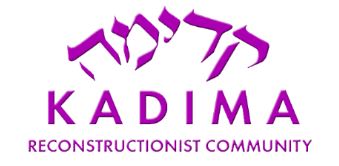Moshe went out to meet his father-in-law; he bowed low and kissed him; each asked after the other’s welfare, and they went into the tent. Moshe then recounted to his father-in-law everything that Ado-nai had done to Pharaoh and to the Egyptians for Israel’s sake, all the hardships that had befallen them on the way, and how Ado-nai had delivered them. And Yitro rejoiced over all the kindness that Ado-nai had shown Israel when delivering them from the Egyptians. (Ex 18:7-9)
So, a few things. One, as we looked at in Torah study this past Wednesday, is the special relationship that Moshe and Yitro have. About Moshe’s blood father, the only verse of Torah we hear about him is Ex 2:1: וַיֵּ֥לֶךְ אִ֖ישׁ מִבֵּ֣ית לֵוִ֑י וַיִּקַּ֖ח אֶת־בַּת־לֵוִֽי׃ [va'yeilech eysh mi'beit leivi vayakach et bat leivi] "A man from the house of Levi went and took a woman of Levi." We never hear of him again, despite hearing a great deal about his birth mother Yochevet, sister Miriam, and brother Aaron. Yitro, on the other hand, we hear quite a bit about, and particularly Moshe’s relationship with him.
In Exodus 2:21, a few verses into Moshe’s arrival in Midian, where he fled after Pharaoh learned of his killing the taskmaster of Mitzrayim, after Moshe has met Tziporah and has been brought to the tent of the Priest of Midian (arguably Reuel or Yitro, or they are the same person or they are the two fathers of Tziporah or they are father and grandfather). The verse reads: וַיּ֥וֹאֶל מֹשֶׁ֖ה לָשֶׁ֣בֶת אֶת־הָאִ֑ישׁ וַיִּתֵּ֛ן אֶת־צִפֹּרָ֥ה בִתּ֖וֹ לְמֹשֶֽׁה׃ [va'yo'el Moshe lashevet et ha'ish va'yitein et tziporah vito la'Moshe]
Moshe yo-el”ed” to stay with the man, and he gave Moshe his daughter Zipporah as wife. This verb yod-aleph-lamed, we looked up on Wednesday, means show willingness, be pleased, to determine, to undertake. Moshe really chose this family. And particularly, it does not say he chose this woman, Tziporah, but this man, his about-to-be-father-in-law.
This is to set the stage. Moshe and Yitro are very good buddies, perhaps, have a chosen father-son relationship perhaps, are lovers perhaps – whatever they are, they come to know each other well and have a very particular bond.
With that context, let us look at these verses we just chanted in the third aliyah. For the first time seeing each other since Moshe asked for his blessing and returned to Mitzrayim to organize toward liberation, Moshe tells this man who he cares about deeply the story of what has happened since they last saw one another. And particularly, the text tells us, what G-d did to Pharaoh and the people of Mitzrayim for their sake. That G-d had liberated them.
This made me wonder how a returned hostage might tell of their escape, their liberation. I went to an event at Hillel UW two Mondays ago and listened to the stories of family members of those still being held hostage in Gaza. The room was full of a deep empathy and also sympathy. The pain of anyone whose loved one is being held captive is hard to bare, even for the witness. They passed out necklaces that read “Bring them home now!” in English and “My heart is captive in Gaza” in Hebrew. I now wear one as I too want the return of every hostage and illegally held prisoner, but I also wear it because my heart is captive in Gaza -- with the millions of Palestinians who are surviving, mourning, fleeing, and the over a hundred Israeli hostages.
Maimonides, the Rambam tells us that there is no greater mitzvah than freeing the captive. How have those already released tell of their story, though? Will they tell it to say all that the Israeli government did to the people of Gaza for their sake? For their liberation? Oof. Or, had Hamas’ attack on Israelis on October 7 actually resulted in the liberation of the Palestinian people, might they have later told the story to friends and allies – look at what Hamas did to the Israelis for their sake? For their liberation?
It is Yitro’s reaction, then, that gets me. We are told he rejoiced in the translation, but the Hebrew is less clear. It read “va’yichad Yitro” in Ex 18:9.
In the Babylonian Talmud, this diasporic set of teachings from ancient Bavel, there is an argument over what this verb va’yichad means, for it could mean “rejoice” but also could mean “grew sharp”
In Sanhedrin 94a: “Rav and Shmuel disagreed with regard to the meaning of vayyiḥad. Rav says: He passed a sharp [ḥad] sword over his flesh, i.e., he circumcised himself and converted. And Shmuel says: He felt as though cuts [ḥiddudim] were made over his flesh, i.e., he had an unpleasant feeling due to the downfall of Egypt.”
I can appreciate Shmuel’s interpretation. It comforted me in the midst of a problematic story being read in a terribly problematic moment in history.
Yitro felt as though his skin was cut upon hearing of what happened to Mitzrayim – for he did not like it. He did not agree. He felt their pain. He perhaps knew that liberation does not come from the downfall of others.
As we are still in the midst of a terrible violence, figuring our way to relate to it, to stop it, to talk about it, to have joy in our lives despite it, to mourn and feel the pain of it, may we have the strength, the courage, and the support to invite ourselves and others into feeling the ways this is hurting us, and may we talk about it with care such that we can tend to the ways it is hurting others. And may we reunite with family – chosen and blood – to do this with, not just after this ordeal, but along the way.

 RSS Feed
RSS Feed